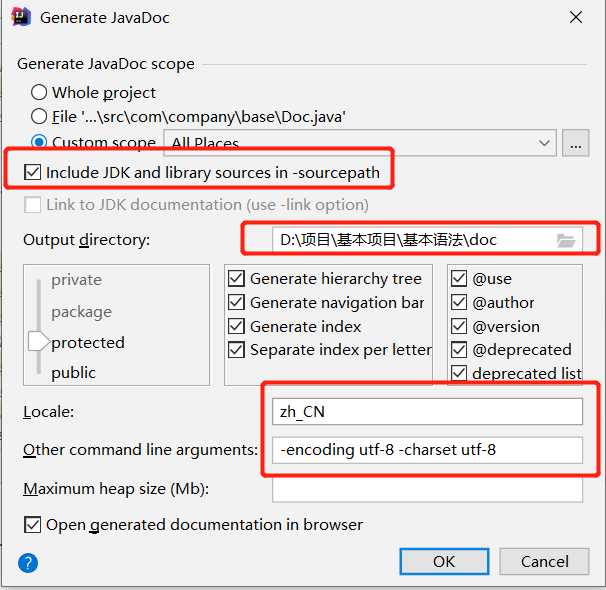java Foundation
Type conversion
Low ----- > High
byte,short,char ->int ->long -> float ->double
Force conversion
- Form: (variable type) variable name
- Attention
1. Boolean values cannot be converted
2. Object types cannot be converted to irrelevant types
3. Force conversion when converting high capacity to low capacity
4. There may be memory overflow or accuracy problems during conversion!
Automatic conversion
variable
-
Variable: variable quantity (variable must declare type)
-
Variables include: variable name, variable type, and scope
type varName [=value] [{,varName[=value]}] -
Variable scope
- Class variable
- Instance variable
- local variable
public class Demo4 {
//Class variable static
static double salary =2500;
//Attributes: Variables
//Instance variable: subordinate to object; You do not need to initialize, but use it as its default value:
//Value type: 0 / 0.0
//boolen: false
//All are null except the basic type
String name; //null
int age; //0
//main method
public static void main(String[] args) {
//Local variables: must be declared and initialized
int i=10;
//Variable type variable name
Demo4 demo4 = new Demo4();
System.out.println(demo4.name);
System.out.println(demo4.age);
//Class variable static can be used directly
System.out.println(salary);
}
}
constant
//Modifier, no order exists
static final double PI=3.14; //Or final static double pi = 3.14;
public static void main(String[] args) {
System.out.println(PI);
}
Naming conventions
- All variables, methods and class names: see the meaning of the name
- Class member variable: initial lowercase + hump principle
- Local variable: initial lowercase + hump principle
- Class name: initial size + hump principle
- Method name: initial lowercase + hump principle
- Constants: uppercase letters and underscores MAX_VALUE
operator
The java language supports the following operators
-
Arithmetic operator
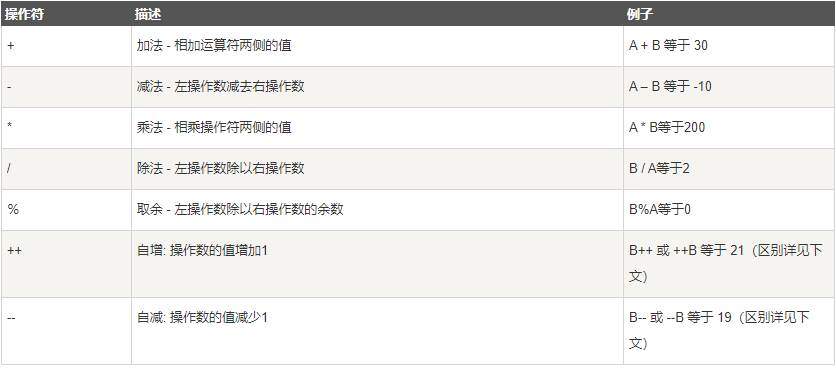
-
Relational operator

-
Bitwise Operators
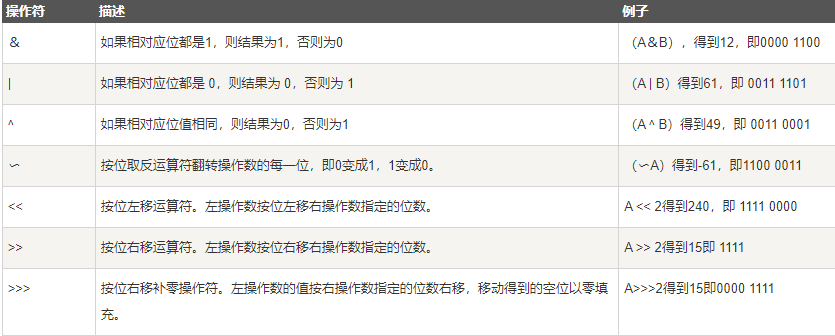
-
Logical operator

-
Assignment Operators
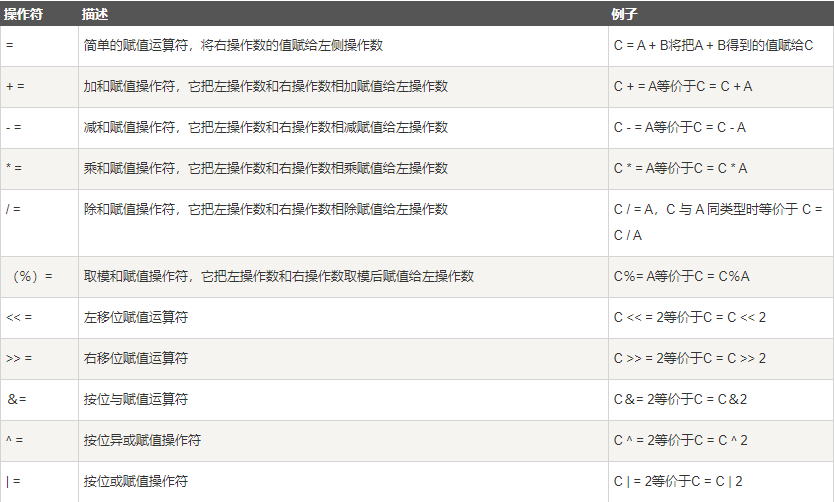
-
Other Operators
Conditional operator (?:)
Conditional operators are also called ternary operators. The operator has three operands and needs to judge the value of the Boolean expression. The main purpose of this operator is to determine which value should be assigned to the variable.
variable x = (expression) ? value if true : value if false -
instanceof operator
If the object referred to by the variable on the left side of the operator is an object of the class or interface on the right side of the operator, the result is true.
( Object reference variable ) instanceof (class/interface type)
String name = "James"; boolean result = name instanceof String; // Because name is a String type, it returns true
Operator priority
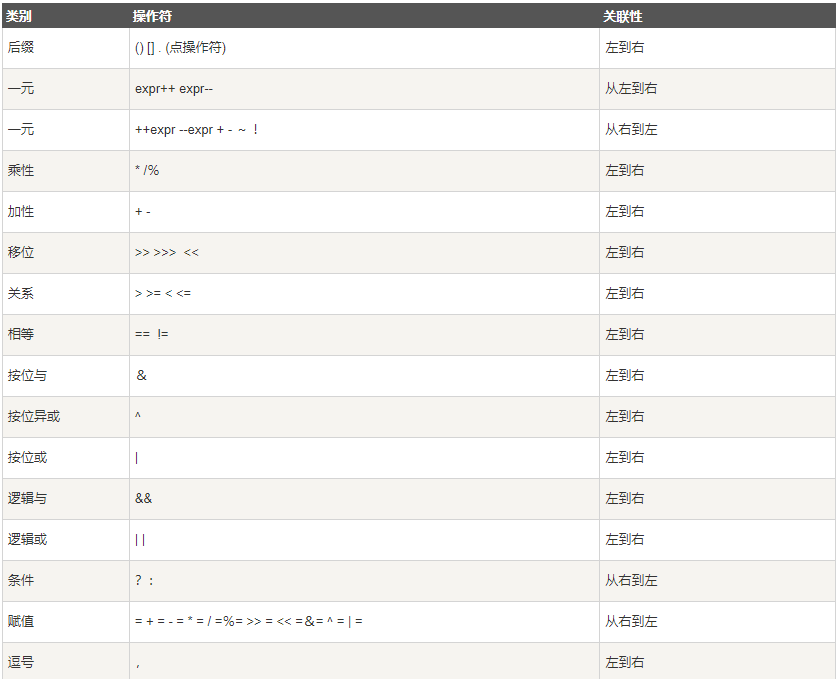
//Binary operator
//ctrl+D: assign the current row to the next row
int a=10;
int b=20;
int c=30;
int d=40;
System.out.println(a+b);
System.out.println(a-b);
System.out.println(a*b);
System.out.println(a+b);
System.out.println(a/(double)b); //0.5
//Binary operation for different types
System.out.println("================"); //0.5
long a1=124L;
int b1=123;
short c1=10;
byte d1=8;
double e1=8.0;
System.out.println(a1+b1+c1+d1+e1); //Double has a higher type than int, and the result is the highest type
System.out.println(a1+b1+c1+d1); //Long has a higher type than int, and the result is a higher type
System.out.println(b1+c1+d1); //Int
System.out.println(c1+d1); //Int
//Unary operator
int x=a++; //First assign a value to x in auto increment
int y=++a; //Assign a value to y by self increment first
//Power operation 2 ^ 3 2 * 2 * 2 = 8 many operations are performed using tool classes
System.out.println("================");
double pow = Math.pow(2,3);
System.out.println(pow);
//Logical operation
//->Short circuit operation
System.out.println("================");
int q=5;
boolean w=(q<4)&&(q++<4); //If Q < 4 is judged as false, w=false is known, and Q + + < 4 is not judged
System.out.println(q);
System.out.println(w);
//Bit operation
System.out.println("================");
/**
2*8=16 2*2*2*2
High efficiency!!
<< *2
>> /2
0000 0000 0
0000 0001 1
0000 0010 2
0000 0011 3
0000 0100 4
0000 1000 8
0001 0000 16
*/
System.out.println(2<<3);
System.out.println(8<<1);
//String connector
System.out.println("================");
a=10;
b=5;
a+=b; //a=a+b
System.out.println(a);
a-=b; //a=a-b
System.out.println(a);
//String connector +, string
System.out.println(""+a+b); //'10' + '5' first String type is changed to String
System.out.println(a+b+""); //After 10 + 5, String is calculated first, and the operation result is converted to String;
Package mechanism
-
Function: used to distinguish the namespace of class names (generally using the inversion of company domain names as package names)
package pkg1[.pkg2[.pkg3...]] -
To use package members, you need to import the package, and use the "import" statement
import package1[.package2...].(classname|*);
javaDoc
-
Function: javaDoc command is used to generate its own API documents
Link: JDK help documentation -
parameter information
@Author: author name
@Version: version number
@since: the earliest JDK version required for naming
@Description: description
@param: parameter name
@Return: return value
@date: date
@throws: exception thrown -
Generation method
1. Use the command line to generate
a. Open the file where the class is located and execute cmd
b. Input: javadoc -encoding UTF-8 -charset UTF-8 Doc.java
2. Generate using IDEA
a. Tools->Genrate JavaDoc...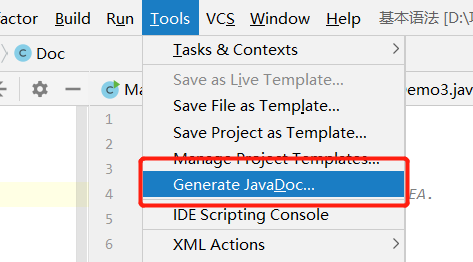
b.-encoding utf-8 -charset utf-8